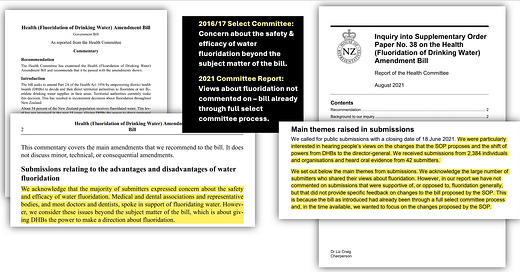Media omissions fuel division on fluoride?
Just another unpublished article. Perhaps my article is pathetic, unwarranted bullshit, and of no interest to Tauranga residents.
REJECTED BY MSM - ARTICLE ON FLUORIDE RISK TO CHILDREN
An OpEd I wrote recently, languished, unpublished. In my email I simply stated that I hoped it would be published online, as I realise the challenge editors balancing content and advertising in limited newspaper space.
Yes, editorial discretion is important. But when does it become bias? We can’t really put a finger on it.
After a presentation to Tauranga City Councillors, where fluoride was the topic discussed, and the Bay of Plenty Times reported on some of the content. The BOP Times omitted all content that directly criticised current policy and explained why the current policy was deficient (presentation notes provided to Councillors and the Bay of Plenty Times reporter who attended). I thought it was timely to suggest an OpEd. It remained unpublished. They have discretion not to publish.
Perhaps my article is pathetic bullshit, and of no interest to Tauranga residents.
But without this information publicly published, Tauranga public will continue to believe that the science that the Director-General relies upon for the order is perfectly acceptable, they will not know that children’s urinary levels of fluoride are higher than adults, they will be unaware of consolidating knowledge, particularly around risk to kids under 8 years old, and likely will not shift their stance on the safety of fluoridated water.
This is the Op Ed sent to the BOP Times:
Media omissions fuel division on fluoride?
Jodie Bruning. Physicians and Scientists for Global Responsibility, New Zealand.
In a Tauranga City Council meeting last Monday, 26 August, Councillors voted to seek an extension to the fluoridation deadline imposed by the Director-General of Health.
While the media have reported on court outcomes, they have refrained from evaluating why the science on fluoride’s safety is so deeply contested. In that Monday meeting Councillor Marten Rozeboom, discussing an earlier proposal that sought introduction stated:
‘The issue I have (with Option 3) is it doesn’t allow the robust debate in the community of what we’ve heard this morning. The debate in our press is too one-sided. Obviously, our Ministry of Health has a quite one-sided approach to this debate. We need to put what we have heard this morning into the public arena. … everything that was heard this morning needs to be in the mainstream press tomorrow morning so the wider public can read it and follow it, and allow the democratic process.’
Rozeboom is correct. New Zealand media are yet to report on an important fluoride-related issue that Physicians and Scientists for Global Responsibility (PSGRNZ) have been working to raise attention to: For the science on fluoride’s safety to be scientifically robust and trustworthy, impartial scientists must show the methods by which the data was selected. This has never been done in New Zealand.
In 2023 PSGRNZ addressed both the Bay of Plenty Regional Council and Tauranga City Council on this subject. Yesterday’s coverage of the council meeting also ignored this policy gap, even though NZME had received the notes to the PowerPoint presentation.
The Director-General of Health has relied on 2014 and 2021 reviews by the Office of the Prime Minister’s Chief Science Adviser (OPMCSA) to claim scientific authority. The 2021 review was released one day after a supplementary order paper was released in 2021. The timing could not be more political.
Democratic convention requires that either medical treatments or hazardous substances released into humans and the environment, should undergo either trials to prove safety and efficacy, and/or risk assessment to understand risk-based issues relating to hazardous (toxic) substances.
Fluoride has been released into municipal water since the 1960’s, but risk assessment has never been undertaken. Local councils are well aware that it isn’t a medical grade drug that is added to municipal water, but a slurry called hydroxyfluorosilicic acid. That hasn’t been assessed for safety either.
The general public, and indeed the courts, seem not to be aware that the scientific rationale used by the Director-General is unfit for policy. Policy formulation must follow conventions to sustain public trust. Policies that claim to be based on scientific evidence, must follow robust and transparent processes. Risk assessment, and drug trials are required for this purpose.
Risk assessment is designed to shed light how a medical drug or toxic substance may cause harm, i.e. be hazardous, and at what level of exposure that harm might occur. Particular attention must be paid to infants and young children with developing organs (including brains). Babies and young children consume more by body-weight, and when it comes to fluoride, they absorb up to 80% of fluoride ingested, into their bones. Adults do not.
Without impartial, trustworthy risk assessment we cannot really know what the balance of risk really is.
Globally, topical fluoride treatments are often advocated for, ‘given the optimal risk-benefit ratio’.
PSGRNZ submitted on fluoride’s risks, to government committees in 2017 and 2021. The 2017 Select Committee and the 2021 Inquiry Committee promptly dismissed public concerns because comments on the safety of fluoride were ‘beyond the subject matter of the bill’.
Four years later, in 2021, the committee did not comment on public concerns because the bill ‘had already been through a full select committee process’ (in 2017).
Fairness is a guiding principle of administrative law.
Following the 2021 Inquiry the government inserted section 116 into the Health Act 1956.
Section 116 carries a low evidence bar. The Director-General of Health merely has to consider a reduction in the prevalence and severity of tooth decay. An obligation to consider safety is not required.
Risk-benefit questions, whereby infants and children may be exposed to levels of fluoride that lower IQ, are not required to be weighted inside any claimed marginal reduction in caries prevalence. Nor is the ethical dilemma where socio-economic inequalities track with ultraprocessed food consumption, encouraging dental decay rates far beyond any claimed reduction. This is ignored.
Moral jeopardy is not a problem for the Director-General.
The courts are clearly fatigued by fluoride-related court cases. Following a judgement against a group seeking to halt the introduction of fluoride to the urban supply of Hastings, Judge La Hood, accepted the Director-General of Health and Attorney-General’s submission that ‘in reality the case reflected the special interests of their members’ and awarded costs to Hastings District Council and the Crown.
The interest shown in Tauranga City Council’s meeting, where so many people attended that people were sent out to the foyer, and where some 1,500 views of the meeting occurred in the forty-eight hours afterwards, is testament fluoride’s safety as a much broader public-interest issue than Judge La Hood suspects.
Fluoride is not an essential nutrient. Healthy teeth depend on a wide range of minerals and trace elements, and limited access to sugar sweetened beverages and ultraprocessed foods.
Poor diets high in ultraprocessed foods and sugar sweetened beverages not only drive tooth decay, but chronic disease, including obesity, diabetes, cancer and mental illness. It’s time the Ministry of Health woke up. But they don’t have to, if the media won’t challenge Ministry officials on what might be considered to be deficient science and inadequate policy formulation.
J.R. Bruning is a sociologist (B.Bus.Agribusiness; MA Sociology(Res)) based in the Bay of Plenty, New Zealand. Bruning is a trustee of Physicians and Scientists for Global Responsibility (PSGRNZ). Her primary research focus is on the relationship between governance, policy, and the production of scientific and technical knowledge for public good. Her Master’s thesis focussed on funding barriers which prevent scientists from researching the drivers of chronic illness. Other writing can be found on JRBruning.Substack.com and at TalkingRisk.NZ






https://x.com/TheChiefNerd/status/1852752540720599405
Perhaps not.